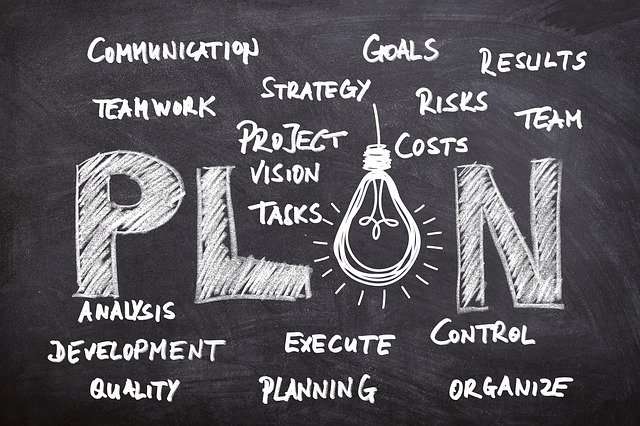
by Suellen | Meeting the Challenges, Success, Vision and Goals
Did you know that you can improve your mindset by improving your habits.? Those daily or weekly things you do over and over.
Changing your mindset takes time and work. There’s no magic that will let you do it overnight.
Yet adopting a few habits will make the process easier and take less time.
Let’s look at Five.
1. Create a morning ritual to get your day off to a good start
What makes you feel best in the mornings? What can you do to set yourself up for success every day?
One great habit as a Christian is praying. It’s like checking in with headquarters first thing. Thanking God for your life and that you know Him. Thanking Him for guiding you throughout the day.
Maybe it’s journaling over a cup of coffee or going for a morning run. Maybe it is taking a few minutes to stretch before you get in the shower.
It might even be something as simple as making your bed before you leave for work.
Figure out a ritual that works for you and prioritize doing it every day.
2. Reflect on your day
Every night before you go to bed, take a moment to reflect on your day. What went right? What went wrong?
Did you get done what you wanted to do? Why or why not?
What can you do to make sure tomorrow goes well?
3. Practice gratitude daily
Find at least one thing you can be grateful for every day. No matter how bad things might be going, you have some good things in life you can be grateful for.
Stop and be thankful for them every day. This only takes a few seconds and can be done any time of the day.
4. Always be working toward a goal
Big or small, it doesn’t matter. The important thing is that you always have a goal. You want to decide on a goal that stretches and challenges you. When you reach one goal, move on to another. Break big goals down into subgoals that will help you see quick progress.
5. Start journaling
Use prompts to write a journal entry about your mindset 2-3 times a week.
Or free write, and see what comes out. You don’t need a fancy journal; a pen and a sheet of paper or a notebook are all you need.
Again, these habits aren’t magic. They won’t change your mindset overnight. What they will do is support you and help you along on your journey.
They will motivate you to keep going when things get tough and to feel your best. That will help you cultivate your growth mindset.
When you change even tiny habits, they add up to make a big difference in your life and in your work.
For More Information about Setting Your Goals, Go Here.

by Suellen | Meeting the Challenges, Vision and Goals
Did you know that your environment has a big impact on your mental health? This includes your mindset.
It’s true; research has shown that the spaces you spend the most time in (your home and your workspace) have a dramatic impact.
While it won’t work miracles, improving your environment to make it more conducive to a growth mindset will not only improve your mindset but boost your mood and increase your personal growth. Here are several ways to do it.
1.) Bring in natural light
Humans are designed to spend lots of time outdoors. Our ancestors spent most of their time outside. Only in the modern era have we reversed that.
An easy way to make your environment more conducive to a growth mindset is to let in more natural light. Open windows or doors and let the sun in.
Hey! If you work on a laptop, why don’t you try sometimes working on your patio or porch?
2.) Add light, bright colors
Dark, somber colors can make you feel down and de-energized. Neutral colors have little effect, and bright or light colors do the opposite.
You might not be able to change the colors of the walls and furnishings, especially at work. Instead, bring in plenty of brightly colored accents.
3.) Declutter
Uh-oh!
Cluttered spaces raise our stress levels and make us feel scattered. This effect may or may not be conscious.
Get rid of the excess and see how much better you feel.
4.) Tidy up and organize
Keeping things neat, clean, and organized boosts your mood and makes your space a better place to work.
Get organizational supplies to put must-have items neatly away and out of sight.
5.) Add lots of greenery
Plants have the same sort of effect on mental health as natural light does and for the same reason. Bringing plants into your home will make you feel better and immediately boost your mood.
Over the long term, tending to plants and keeping them alive and healthy is great for growing your mindset too.
6.) Start a vision board
A vision board is essentially a collage of your dreams and goals.
Do you want to buy a house? Find a picture of the type of house you want and put it on the board. Do you want to go to Paris? Pin up a picture of the Eiffel Tower. Put the board up somewhere you can see it, such as above your desk, and look at it often.
Your Free Vision Board Tutorial may be found HERE.

by Suellen | Meeting the Challenges, Success, Vision and Goals
Okay. Okay. I know that you have lots of work to do sitting in that chair. Yet all of the experts tell us to get up and get moving.
Of all the things you can do to boost your mindset, exercise is near the top of the list. It not only improves your mindset but does so with relatively little mental “work” compared to most of the other methods you can employ.
So what are the top 5 benefits of exercise?
1.) Exercise Makes You Feel Good
Exercising causes your body to release feel-good hormones. Norepinephrine, Serotonin, and Dopamine are released in your brain to lift your mood, make you feel better physically, and make you more optimistic.
These hormones are noted for reducing depression, improving self-esteem, and increasing your confidence.
2.) Exercise Clears Your Mind
One of the greatest benefits of exercise is that it helps you clear your mind of distractions. It gives you something to think about other than your problems and your to-do list.
This “blank slate” effect both boosts your mood and temporarily improves your mindset.
3.) Exercise Reduces Stress Levels
Are you feeling stressed?
Go out and exercise. Working out physically burns stress chemicals out of your body, making you feel better and improving your mood and mindset.
Surprisingly, it doesn’t take a lot of exercise for the good effect. A brisk ten-minute walk is enough to do it.
4.) Exercise Improves Your Ability to Concentrate
The benefits of working out also extend to what you do afterward. Getting in a good workout improves your ability to concentrate on other tasks for several hours after you finish.
This makes you more productive and puts you in a better mood.
5.) Exercise Results in Better Sleep
All of the other benefits of exercise combine to create one more: better sleep.
Exercising results in improved sleep, both in quality and quantity. Getting enough good-quality sleep is one of the most important parts of improving your mindset.
Good sleep makes everything seem better and lack of it makes everyone grumpy.
Exercise has many important benefits other than its effects on mindset and personal development, of course.
It improves your health and longevity, just for starters.
But its effects on your mind shouldn’t be understated.
So start an exercise program. You decide what will work for you.
It’s not necessary to hire a personal trainer or join a gym to get these benefits. Start by walking a few days a week. Ten minutes is enough to start. Gradually increase your walks to 20 or 30 minutes and you’ll feel better in every possible way.
Get up and get moving in the way that works for you!
For more about Secrets of Happiness, check out this Done-For-You Content for you and your clients.

by Suellen | Meeting the Challenges, Vision and Goals
You may have heard so many people talk about goals that you are tired of hearing about the subject.
I’ve been there.
You may be like me – and have a very busy life. When our lives contain many demands, we can be run by what’s known as the “tyranny of the urgent.” All of these things that you “have to do,” demand all of your time.
At the end of the day, you are tired and worn out. You just want to relax a little.
Yet there’s another saying. “If you don’t know where you are going, you might wind up some place else.” In other words, You and I need to have goals. Targets to reach for. Points of focus for our energy
So what are your goals? Do you have any? Or is that part of the problem?
Goals are important at every age; they give you something to focus on, challenge you, and give you a feeling of accomplishment when you succeed at reaching them. Improving your mindset will help you reach your goals, but first, you have to know what they are.
Take out your journal or a sheet of paper and a pen and write down your top five goals for your life. Big or small, it doesn’t matter. Write down the goals that YOU want to reach, not that society expects you to want. Pray about it. These are very personal.
When you’ve finished, look at the list and prioritize it. Take your top goal -the most important one you want to accomplish -and make a plan to reach it. It doesn’t matter if this goal is big or small, whether it’s something as big as starting a business or as small as putting together a 1,000-piece puzzle. Make your plan and incorporate it into your mindset and self-improvement program. This is now what you’re striving for.
But what if your page is blank? What if you don’t know what your goals are, or you don’t have any? Well, your task now is to come up with some. Again, these have to be goals that are unique to you, not to the broader society. If you don’t want to ever own a house, don’t make that a goal.
Take out another sheet of paper. Close your eyes. Now imagine that time and money weren’t an issue. What would you do? You can do anything, anything in the world. Write down the first five things that come to mind. Next, write down five things that you enjoy doing and would like to do more of if you could find the time.
Compare the two lists. You’re probably going to find a significant amount of overlap. These are the things you really want. This is where your heart lies. Psalm 139 talks about your “unformed substance” which God put there. Many times your desires arise from that part of you . Your innermost being. Listen to that still small voice within you.
Select a few of these things -three is enough to start with -and turn them into a concrete goal. “Travel more” could become “Take a cross-country trip in an RV next summer,” for example.
If your goal is to write a book, start smaller. Plan to write posts online. Start a blog, or write on Medium.
Think how you can start working toward those goals.There are no beginnings that are too small. Every step will bring you closer.
Having goals is an important part of your plan to improve your mindset. You need the challenge and the effort to catalyze your mindset shift and personal growth. You also need them to live your best life. Working on your goals is a win-win!
Check out this Done for You Pack Set Your Goals. You can share these posts, graphics, and more with your clients.

by Suellen | Meeting the Challenges, Online Success, Vision and Goals
Failure!! Ugh!! No one likes it!
Everyone wants to succeed, preferably on the first try. Unfortunately, that’s not realistic. You’re going to fail on your journey to improve your mindset and change your life. You’re probably going to fail many times.
If you are reaching out for growth, you will fail sometimes. Remember the stories. Babe Ruth for many years held the record for most Home Runs in Baseball. (He also held the record for most Strike Outs). Thomas Edison is well known for inventing the light bulb. (What isn’t as well known is that he finally succeeded after 10,000 attempts).
So failure is a stepping stone on the way to success! Think of it that way.
So how should you handle failure constructively without getting frustrated? These tips should help you.
1.) Figure out why you failed. Look at your failure analytically. What caused it? What did you do wrong? Is there something you could do differently next time? Or was the failure outside of your control?
2.) Change things before you try again. Did you approach the problem wrong? Change how you do it next time. Were the conditions wrong, the timing? Were you adequately prepared? These are all things you can remedy before your next attempt.
3.) Ask for help. Don’t be a lone wolf! Life is hard, and challenges often require the input of more than one person. Find someone with more knowledge and experience than you and ask them to mentor you or help you solve the problem. You can find someone to help you with any problem, big or small, from an academic issue to work problems to dating. You just have to ask!
4.) Look at and appreciate the progress you’ve made. Sure, you might have failed, but did you learn something? Are you further along than you were before? Of course. Look at how far you’ve come since you started on this journey. Appreciate it and congratulate yourself before tackling your failure again.
5.) Consider adjusting your expectations. In other words, did you try to go too far too fast? You’re not going to create a masterpiece (or become CEO) overnight. Did you try to improve too much at once? Look at your expectations and adjust them before trying again. Remember the one-percent rule -improving by one percent each attempt will get you to your goal faster than trying (and failing) to make big leaps.
Above all, don’t give up! You can reach any goal you set your mind to. You just need to find the right way. It took Thomas Edison over 10,000 tries to invent the light bulb. He used to say that he hadn’t failed; he’d just found 10,000 ways that wouldn’t work!
You can put this knowledge to work for yourself. Follow the tips above to evaluate your failure, adjust what you’re doing, and try again. You can do it.
For more hints on Goal Setting for you and your clients, go HERE.

by Suellen | Meeting the Challenges, Vision and Goals
We humans are an impatient lot. When we want to do, achieve, or get something, we want it today, if not yesterday. This leads directly to impatience and frustration. It leads many people to give up when they’re on the verge of success.
Success takes time. Achievement takes time. Learning a new skill takes time, even if it’s something simple. Have you ever watched a young child learn to do something you take for granted, such as learn to walk?
Success is halting, uneven, often looks like going backwards, and sometimes involves falling on your backside (or your face).
The same is true of doing more difficult things as an adult. It takes about 10,000 hours of practice to master a skill. That’s almost 5 years of full-time work! This is why it’s said that we overestimate what we can do in one year and underestimate what we can do in ten years.
This is where the One Percent Rule comes in. It allows you to make visible, satisfying progress rapidly without expecting overnight success. It’s a simple rule: when you attempt to do something, aim to do it one percent better than before. Or finish one percent more.
If you practice this rule and do so faithfully, before long you’ll have mastered the skill or finished the task. Perfecting something is hard; doing it 1% better or finishing one percent more of a task is relatively easy. It’s a goal you can see and reach almost immediately.
You can apply this rule to anything.
Are you trying to learn to live by a budget? Aim to do 1% better each month.
Are you trying to increase how much you save? Increase it by 1% per month until you reach your ultimate goal.
You’ll see the progress every month but not feel a lot of pain from it.
Do you want to improve your self-talk? Set a goal of achieving 1% improvement every week or month.
Trying to start and keep an exercise routine? Once you get the habit down, aim to increase it by 1% a week.
Using a software program to learn a new language? Make your goal completion of 1% of the program every time you log on.
The uses of this rule are infinite. It’s one of the best ways to improve your mindset and achieve the personal development you want. It will fulfill your brain’s desire for immediate gratification and simultaneously fuel your long-term success.

















